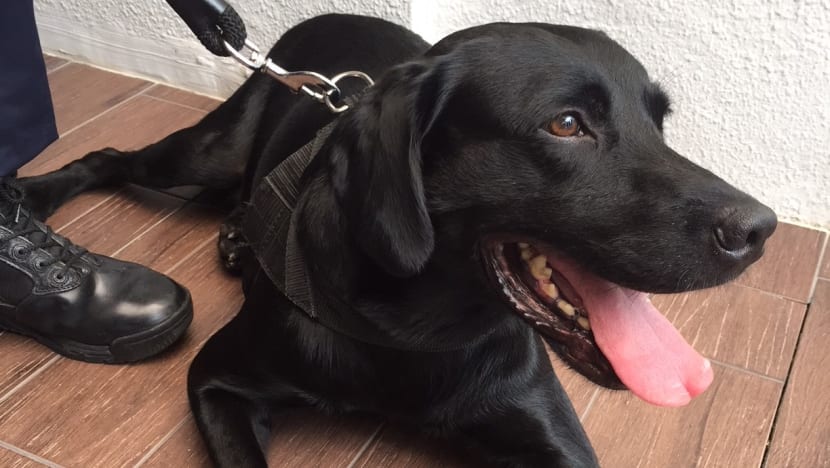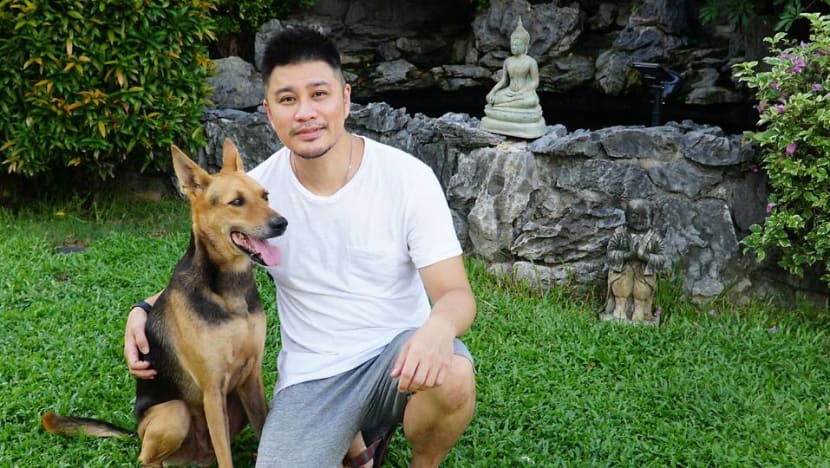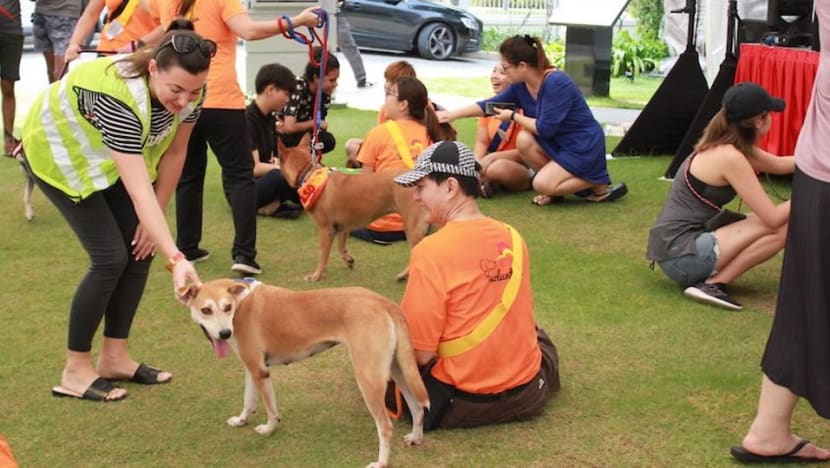commentary Commentary
Commentary: We never give up trying, but not every rescue dog will find a home
It is important that dog lovers and rescuers understand that not everyone can afford the same level of commitment when taking care of a dog, says SOSD president Dr Siew Tuck Wah.

A dog at a Save Our Street Dogs exhibition in 2018. (Photo: Facebook/Save Our Street Dogs)
SINGAPORE: Rescuing a dog is the easy part. The difficult part is finding it a suitable home.
Indeed, SOSD - a Singapore-based organisation dedicated to rescuing, rehabilitating and rehoming abandoned dogs - receives multiple calls to help homeless dogs every day. Some of them are injured or abandoned, while others are strays as kind callers are worried about them being caught and impounded if they remain in the open.
As much as animal shelters would love to take in every dog, we simply cannot, because of the lack of space. Nor is it the practical thing to do. The speed of getting dogs adopted is just not fast enough.
READ: Commentary: Are we inept at handling wild animals that come our way?
The odds are stacked against finding homes for rescued dogs, especially mongrels, in Singapore.
To begin with, mongrels, which are larger in size, are not allowed in HDB apartments. Although the change in regulations have made adopting them easier, there is also an inherent unwillingness to adopt a dog which is considered “not pure”.
Many, unfortunately, either prefer smaller dogs, pure-bred dogs, or designer dogs such as a labradoodle.
BEHAVIOURAL ISSUES
One other, less discussed, reason for this difficulty comes from the fact that rescued dogs often have behavioural issues which need to be worked on.
Contrary to popular belief, behavioural issues in dogs may not be a direct result of previous abuse. It could be due to poor socialisation, as is the case with ex-breeding dogs who are kept in cages all their life, or simply a direct result of selective pressure. This is the case with many stray dogs.

Stray or community dogs have been prosecuted for decades. According to data published by the Agri-Food and Veterinary Authority of Singapore (AVA), in 2015 alone, 942 dogs were put to sleep.
According to observations by animal groups like ours, the dogs who shied away from people survived and passed this paranoia or apprehension down to future generations of puppies.
READ: Commentary: Battling with the mynas who come into my home and won't leave
That is the reason why a large proportion of the puppies SOSD now rescues are skittish and require a period of rehabilitation before they are ready for adoption.
There is a wide spectrum of behavioural issues in dogs. They commonly stem from fear. Many dogs cower in the corner of their enclosure for days and weeks when first rescued. It is only with the constant effort and patience of volunteers do they finally learn that we are here to help them, and allow us to touch them and put a leash on them.
Other dogs channel their fear in a different way. To protect themselves from being harmed, they may even bite when people come too close. This is termed fear aggression.
ADOPTION IS NOT THE END
Behavioural issues can also develop or worsen later in a dog’s life. Such was the case with Loki, the dog who was adopted as a puppy and tragically euthanised when he started biting people and attacking other dogs.
We do not always know the reason why, but often, it is because owners fail to spot and correct bad behaviours, like biting and guarding food, when they first arise in puppyhood.
It’s important to note that behavioural issues sometimes cannot be completely eliminated, but they can be managed.
READ: Commentary: The truth behind returning wildlife is less feel-good than you think
Adopting such a dog requires time, effort and commitment.
This may mean consultation with qualified trainers, lifestyle changes, and even changes to the environment to ensure the safety of other dogs and people at home.
For example, when I adopted a troubled dog two years ago, I had to build partitions in my home to separate him from other dogs. I also had to make sure that he was kept away from visitors, especially children. Extreme care has to be taken during mealtime so that fights will not break out.

It is also equally important that dog lovers and rescuers understand that not everyone can afford the same level of commitment when taking care of a dog.
THERE ARE ALWAYS OPTIONS
One of the more common scenarios we encounter occurs when owners decide to give up a biting dog after having a newborn in the family. Before the baby’s arrival, they were still able to manage, but with a baby around, they simply did not want to take any chances of an accident.
In these cases, SOSD tries to be as supportive, non-judgmental and constructive as possible. It is a situation which nobody wants – not the family, not the shelter and certainly not the dog.
It is probable that Loki’s adopters did not return Loki to the organisation they adopted him from because they were afraid of getting blamed by other dog lovers for doing so. Instead, they sought other solutions - euthanasia - when they felt they had exhausted all options. It was a tragedy which could have been avoided.

Many shelters have a strict adoption process. It not only includes phone screening, but also a home visit and a trial adoption period. These shelters are not trying to be difficult but are doing so because they understand that it isn’t easy to take care of a dog with medical or behavioural problems.
The process ensures that shelters find the most suitable dog for an adopter, taking into consideration their lifestyle, family dynamics, and their level of experience.
READ: Commentary: How to walk a dog in Singapore’s time of coronavirus
Not every rescue dog will find a home. Some of them grow old and die in a shelter.
But no matter the challenges, we will never give up trying. We believe that somewhere out there, there is a suitable home for every homeless shelter dog.
Even dogs which are deemed aggressive can be adopted if the owner knows how to work on the problem areas and avoid triggers.
From personal experience, I can confidently tell you that caring for a dog with behavioural issues is a truly fulfilling experience. There is no greater reward than having a dog trust you, and show love and affection back at you.
Dr Siew Tuck Wah is president of SOSD.














